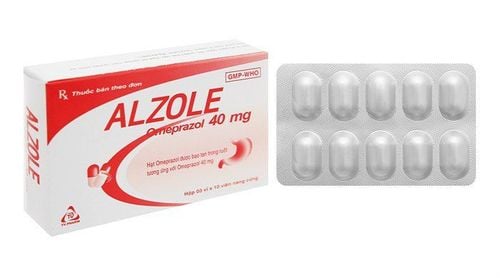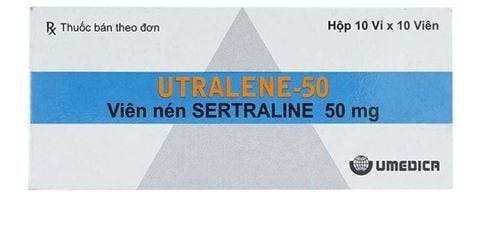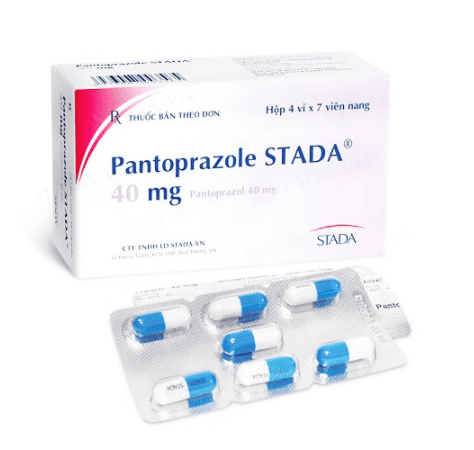This is an automatically translated article.
Prabezol also known as Aciphex is a medicine that reduces stomach acid. Prabezol is used in the treatment of gastroesophageal reflux disease, peptic ulcers, and excess stomach acid production such as in Zollinger-Ellison syndrome. Let's learn more about what Prabezol is used for through the article below.1. What is Prabezol?
Prabezol has the main ingredient is Sodium Rabeprazole belongs to the group of gastrointestinal drugs, is indicated in the treatment of diseases such as:
Gastric ulcer disease, duodenal ulcer, stomatitis, reflux esophagitis and Zollinger-Ellison syndrome. Rabeprazole is a proton pump inhibitor used to help heal peptic ulcers, to treat the symptoms of gastroesophageal reflux disease. Prabezol is also used to relieve symptoms such as heartburn, difficulty swallowing. Mechanism of action:
Prabezol blocks the production of acid in the stomach. It relieves symptoms and prevents damage to the esophagus or stomach in patients with gastroesophageal reflux disease (GERD) or stomach ulcers.
2. Dosage and usage
How to use: The drug is prepared in the form of soluble tablets and used orally. Prabezol should be taken one hour before meals, preferably in the morning. Patients should try to take their medicine regularly at the same time each day as advised by their doctor.
Dosage:
The prescribed drug dose and duration of treatment are based on the patient's health status and response to the patient's body.
Dosage for adults: Use 10mg / day, can be increased to 20mg / day depending on the severity of the disease.
Duration of treatment: For duodenal ulcer disease lasts from 4 to 8 weeks, gastric ulcer and reflux esophagitis lasts from 6 to 12 weeks.
For patients with kidney failure and liver failure, it may not be necessary to adjust the dose of the drug, but apply the same dose as a normal person. Due to the fact that the patient has kidney or liver problems does not affect the metabolism of rabeprazole.
Contraindications:
Do not use in cases of allergy to rabeprazole, benzimidazoles or hypersensitivity to any ingredient of the drug. Concomitant use with rilpivirine is contraindicated, which is a drug used to treat HIV infection.
3. Side effects
The most common side effects include headache, nausea and diarrhea, dizziness, sore throat, abdominal pain, rash, urticaria, hematologic changes, effect on liver function, constipation, cold abdominal distension, abdominal heaviness.
Other rare side effects include rash, flu symptoms and infections (including the gastrointestinal pathogen Clostridium difficile), hepatotoxicity, but the incidence of this reaction is quite low. little.
4. Caution
Proton pump inhibitors, including rabeprazole, may increase the risk of bone fractures, especially with long-term use in high doses in the elderly. Before taking this medicine, you should tell your doctor if you have serious liver problems, are taking HIV medicines, have had an allergic reaction to similar medicines in the past, or have had bone loss (osteoporosis). skeletal ). Use with caution in patients with severe hepatic impairment. Avoid alcohol during drug treatment as it causes the stomach to produce more acid and can aggravate symptoms. Pregnancy: The drug may not be safe to use during pregnancy. Because animal studies have shown the drug to have harmful effects on the fetus. Therefore, before treatment, patients should weigh the potential benefits and risks that Prabezol brings. Lactation: Prabezol is POSSIBLY UNSAFE when used during breast-feeding. Because the drug can be excreted in breast milk and harm the development of the baby. For people who need to operate machinery and drive vehicles: When performing these tasks, patients should not use the drug because the drug can reduce alertness, affect vision, cause drowsiness and dizzy.
5. Drug interactions
A drug interaction is a change in the way a drug works, such as making it less effective or increasing the risk of serious side effects. Therefore, patients need to inform their doctor about the drugs they are using including prescription drugs, non-prescription drugs and drugs that are functional foods.
Abacavir: Abacavir may decrease the rate of excretion of Rabeprazole, which may lead to higher serum drug concentrations. Abatacept: The metabolism of Rabeprazole may be increased in combination with Abatacept. Alendronic acid: The therapeutic efficacy of Alendronic acid may be reduced when used in combination with Rabeprazole. Amphetamine: Rabeprazole may increase the absorption of Amphetamine leading to increased serum concentrations and potentially worsening of side effects. Ketoconazole and digoxin: Prabezol may affect the absorption of these drugs. Clopidogrel: Prabezol may interfere with the conversion of anticoagulants Apremilast: The metabolism of Rabeprazole may be increased when combined with Apremilast.













